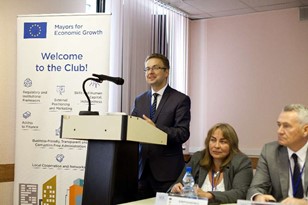The EU Initiative “Mayors for Economic Growth” is supported by local authorities of Belarus
The European Union’s Initiative “Mayors for Economic Growth” which was launched in January 2017 in the Eastern Partnership countries, is being actively implemented in Belarus. Natalia Efremenko, country expert for Belarus, and Olga Sovetnikova, junior project expert, tell us about the achievements and discoveries of the project and the challenges encountered.
- What do you think makes Belarus special when it comes to the “Mayors for Economic Growth” Initiative?
 Natalia Efremenko: — All over the world, the private sector is the main driver of the economic growth and development, and Belarus is no exception. Our Republic is featured by the predominance of state ownership and state control over most of the country's assets and resources. The state determines the institutional environment for doing business not only through the legislation, but also through the governance system. In this system, the local government and self-government stand out. Each region, city and town of Belarus has its own completely unique competitive advantages that can contribute to the economic growth and employment. Local administrations have exceptional opportunities to initiate and implement measures supporting entrepreneurship on a bottom-up basis. Today, we see positive changes – local administrations in Belarus have realized the importance of the public-private dialogue, cooperation and networking with business and civil society for revealing the economic potential of each territory.
Natalia Efremenko: — All over the world, the private sector is the main driver of the economic growth and development, and Belarus is no exception. Our Republic is featured by the predominance of state ownership and state control over most of the country's assets and resources. The state determines the institutional environment for doing business not only through the legislation, but also through the governance system. In this system, the local government and self-government stand out. Each region, city and town of Belarus has its own completely unique competitive advantages that can contribute to the economic growth and employment. Local administrations have exceptional opportunities to initiate and implement measures supporting entrepreneurship on a bottom-up basis. Today, we see positive changes – local administrations in Belarus have realized the importance of the public-private dialogue, cooperation and networking with business and civil society for revealing the economic potential of each territory.
Strategic thinking, favorable local business environment and joined efforts of all participants in economic processes constitute the overall motivation for all the signatories of the Initiative "Mayors for Economic Growth" in Belarus and other Eastern Partnership countries. When participating in the Initiative, the chairmen of the District Executive Committees are interested not only in supplementing the budgets and realizing the competitive advantages of their districts, but also in creating jobs. Such measures will reduce migration. This is a decisive factor for the development of the local economy, and consequently the country's economy as a whole.
 Olga Sovetnikova: — Each region and city of Belarus has certain competitive advantages which can contribute to growth, development and boosting employment. We have very responsible and self-motivated people. Thanks to the EU Initiative "Mayors for Economic Growth", our signatory districts can get acquainted with the experience of other countries, adopt it, and create similar enterprises in their localities. We hope that as a result of participation in the Initiative, conditions for training, supporting, following-up and promoting small and medium-sized businesses will be created in the districts, which in turn will become a real contribution to the sustainable development of the districts.
Olga Sovetnikova: — Each region and city of Belarus has certain competitive advantages which can contribute to growth, development and boosting employment. We have very responsible and self-motivated people. Thanks to the EU Initiative "Mayors for Economic Growth", our signatory districts can get acquainted with the experience of other countries, adopt it, and create similar enterprises in their localities. We hope that as a result of participation in the Initiative, conditions for training, supporting, following-up and promoting small and medium-sized businesses will be created in the districts, which in turn will become a real contribution to the sustainable development of the districts.
- What do you consider to be your main achievement as the country expert for Belarus / junior project expert?
N.E.: — The fact that 22 districts from all six oblasts of Belarus joined the Initiative is a significant achievement. Let's consider the numbers. In 2017, 12 districts participated in the Call for proposals for the “Mayors for Economic Growth Pioneer Projects”. Three of them became the winners: Bragin District Executive Committee, Gomel Oblast, the project “Agribusiness – incubator”; Glubokoe District Executive Committee, Vitebsk Oblast, the project "Creation of Center for Entrepreneurship and Innovations Promotion and Support"; Slavgorod District Executive Committee, Mogilev Oblast, the project "BRIDGE as the Pilot Eco-Business Model for Local and Regional Economic Growth". This is a great result, in my opinion.
 15 of the 22 signatory districts have changed their status from “Junior” to “Acting” members. These districts developed their Local Economic Development Plans and even started to implement them. Importantly, their Plans have not only been developed, but also received the World Bank's approval. This shows excellent qualifications of the Belarusian authorities. If we compare the number of signatories in Belarus which have the status of Acting Members with the overall Initiative data, we can conclude that we have achieved good results. Given the current political and economic situation in the country, this is a real success.
15 of the 22 signatory districts have changed their status from “Junior” to “Acting” members. These districts developed their Local Economic Development Plans and even started to implement them. Importantly, their Plans have not only been developed, but also received the World Bank's approval. This shows excellent qualifications of the Belarusian authorities. If we compare the number of signatories in Belarus which have the status of Acting Members with the overall Initiative data, we can conclude that we have achieved good results. Given the current political and economic situation in the country, this is a real success.
O.S.: — We have a productive dialogue with the signatories and discuss the challenges and opportunities for business and public participation both in development and in practical implementation of the districts’ Plans. It is also important that we take into account the existing potential of the territories, and their natural, economic and human resources.
- What were the main challenges which you faced in your work? How did you handle them?
N.E.: — I can't say that the work with the signatories involves some difficulties. Today, the Belarusian local authorities understand that they live in a dynamically developing world. Developments in the neighboring countries influence the economy of Belarus. One doesn't need to reinvent the wheel to deal with the challenges faced by municipalities. You need to get acquainted with the experience of the neighbors, gain what is useful and adapt to your realities. Probably, our main challenge is to inform the leaders of each of the districts of Belarus about the importance and usefulness of integration into European professional networks in order to expand knowledge, experience and identify new prospects for development. The M4EG Initiative provides such an opportunity.
O.S.: — While working at the project, I didn't experience any serious crisis situations. Natalia and I try to create favorable conditions for cooperation between different groups of people involved in the project and to plan our work effectively. Currently, it is very difficult for the districts to compete with large regional centers for attracting investment, preserving human potential and business development. But this EU Initiative allows the authorities and business to handle these issues more effectively.
- Was there anything in your work that really surprised you?
N.E.: — Thanks to the EU "Mayors for Economic Growth" Initiative, I discovered the Belarusian officials from a new side. My colleague Olga has noted the same. We were pleasantly surprised by the local authorities in the province, namely, their creativity and sincere desire to change the life of their small homeland for the better. Take, for example, the residents of Krasnopolye district of Mogilev Oblast, which was badly affected by the Chernobyl disaster and unable to fully restore its economic and demographic potential. I started working with Krasnopolye in 2014 within another EU project. Today, I can note the obvious progress in relation of the district's local authorities to participation in integration processes and in international technical assistance projects on a range of economic development issues. The motivation of the local authorities has changed. Today, they are strategically focused on increasing employment and self-employment through entrepreneurship and actively attract resources to the economy of their districts. On the part of the M4EG, we will continue to support the implementation of the Local Economic Development Plans and similar initiatives by all available means.
- Tell us the most memorable story (funny, interesting or peculiar) from your experience within the project.
O.S.: — During my work, there were many interesting and bright moments. I would note a trip to Tbilisi for training. The training took place in a pleasant, friendly atmosphere. The expert who conducted the training presented fascinating material, talked about the assessment of measurable results of local economic development. In Georgia, I gained a lot of useful knowledge which later came in handy in my work. This trip provided an excellent opportunity to exchange experience, knowledge and skills with colleagues.
N.E.: — To be honest, I admire enthusiastic people who believe in the future of their small homeland. For example, I was not surprised that Novogrudok district of Grodno Oblast became a signatory of the Initiative. The Chairman of the District Executive Committee, Anatoly Markevich, is the true leader of today. It became clear from the first meeting with him. He is a professional and passionate person who is proud of the achievements of the district and does everything possible to ensure that investments and business initiative are properly developed in the areas that are promising for this territory, such as tourism, green energy, transport, handicraft, etc. Moreover, the Novogrudok example shows the synergy from the implementation of various EU projects. Working with such people makes you believe in the success of the economic development of Belarus!






